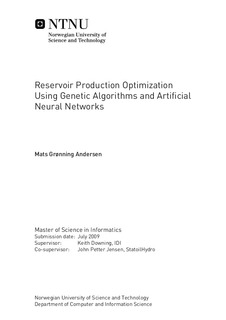Reservoir Production Optimization Using Genetic Algorithms and Artificial Neural Networks
Master thesis
Permanent lenke
http://hdl.handle.net/11250/251403Utgivelsesdato
2009Metadata
Vis full innførselSamlinger
Sammendrag
This master's thesis has investigated how methods from artificial intelligence (AI) can be used to perform and augment production optimization of sub-sea oil reservoirs. The methods involved in this work are genetic algorithms (GAs) and artificial neural networks (ANNs). Different optimization schemes were developed by the author to perform production optimization on oil reservoir simulator models. The optimization involves finding good input parameter values for certain properties of the model, relating to how the wells in the oil reservoir operate. The research involves straightforward optimization using GAs, model approximations using ANNs, and also more advanced schemes using these methods together with other available technology to perform and augment reservoir optimization. With this work, the author has attempted to make a genuine contribution to all the research areas this master's thesis has touched upon, ranging from computer science and AI to process and petroleum engineering. The methods and approaches developed through this research were compared to the performance of each other and also to other approaches and methods used on the same challenges. The comparison found some of the developed optimization schemes to be very successful, while others were found to be less appropriate for solving the problem at hand. Some of the less successful approaches still showed considerable promise for simpler problems, leading the author to conclude that the developed schemes are suited for solving optimization problems in the petroleum industry.
